
Scotland
©2015 Mothers' Union, Province of Scotland.![]() Reg Charity No. SC036459
Reg Charity No. SC036459![]() Privacy Policy
Privacy Policy
Crossing Continents to Combat Trafficking

Crossing Continents to Combat Trafficking
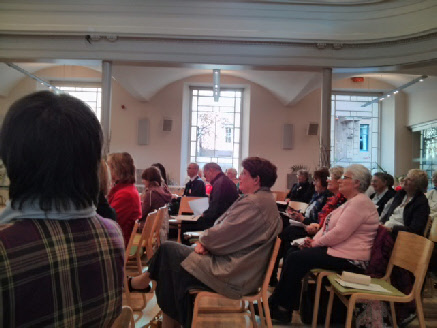
1. Summary
I was recently invited by the Action for Churches Together Scotland (ACTS) Anti-
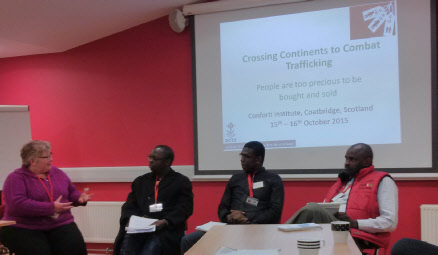
We met at the Xaverian Missionaries, Conforti Institute, Coatbridge for two days.
There were visitors from Malawi, Nepal, Japan, Bangladesh, Jamaica, Czech Republic,
Netherlands and Derby, mainly from the (Church of Scotland’s) World Mission Council
linked partners who shared what they were doing to combat human trafficking. Our
opening address was given by Dr. Aidan McQuade, who is the director of the organisation
Anti-
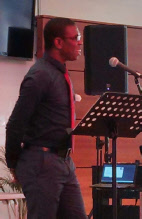
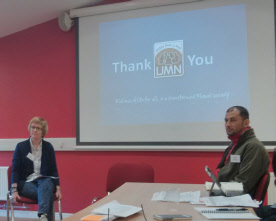
Human Trafficking is modern day slavery. Modern day slavery is principally a social justice issue, which means it is caused by the distribution of wealth, opportunities, and privileges within a society. The reason for human trafficking is poverty.
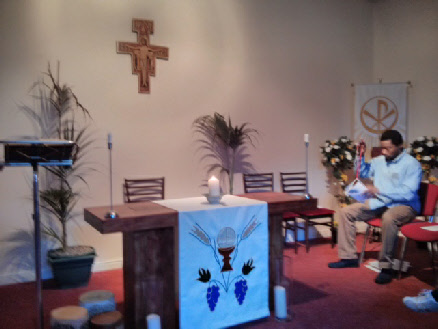
We looked at many Biblical references which demonstrated to us as Christians as to why we felt compelled to stand up and try to make a difference. It was recognised by us as a group that anyone who has empathy can also want to make a difference.
Despite many countries having human trafficking legislation, even years before the UK (Nepal 2008), there are very few prosecutions. This seems to be due to a lack of lawyers and courts(Malawi), a lack of knowledge of the complexity of trafficking, corrupt police (Malawi), an inability to catch the traffickers (they move quickly from place to place), victims too frightened to testify (Netherlands) or distrust of the police (if police in their own country are corrupt). The police need evidence and this is really only possible by getting the victims to testify.
2. Action Points
ACTION BY
2.1 Empowerment of women and children through education;
a) The Mothers’ Union (MU) is doing this already through their Literacy and Development programme, the Family Life program and Parenting groups.
b) In Nepal and their women and child groups were empowering.
MU
2.2 Income generating schemes and vocational training;
a) The Mothers’ Union has many income generating and health/vocational schemes which arise out of their key programmes.
MU
2.3 An understanding of human rights and the law;
For example people need to know about work permits, and how to obtain visas and the law in foreign countries where they want to find work;
a) This could be encompassed by the Mothers’ Union in all their programmes.
MU
2.4 A multi-
Some good examples were from Jamaica and Derby.
a) If each diocese in the UK led similar round table discussions to Derby diocese then we would be making a difference. Check out their website.
ACTS/SEC
2.5 Raise awareness of human trafficking;
1. For potential victims in the UK, who might be homeless or from a children’s home:
i. Educate the children in homes, educate people in homeless shelters.
ii. Give teachers the skills to teach children about HT.
2. For potential victims worldwide:
iii. The Mothers’ Union could build this into some of their training programs.
MU
3. For agencies who are close to these issues:
i. Hold multi agencies gatherings .
ACTS/SEC
4. For Scottish Episcopal Churches (SEC):
i. An article could be put in all their church magazines. (Article enclosed)
ii. Prayer resources/ services held.
SEC
5. For the Mothers’ Union UK and Ireland:
i. Give talks, write articles and prayer resources. The Church of Scotland has excellent resources: information; bible study.
ii. Provide resources for victims of trafficking (eg bags of toiletries) as in Derby.
MU
6. For the general public so that they might be able to identify victims living locally and be able to alert the police. ACTS have a leaflet ‘What are the indicators’
i. We should make our awareness raising eye catching and informative, this came across from our Jamaican friend. Could a song be composed?
ACTS
ii. Derby diocese gave a good example of awareness raising.
SEC
7. If each one of us who read this document took a action it starts the awareness raising.
ALL
We all have a Christian understanding of God’s will for all to live life in fullness as a child of God and we are asked to speak out on behalf of those in need.
3. Conference & Symposium
Aiden opened by explaining what a complex subject human trafficking was:
3.1 What is slavery?
1. It is inflicted on the Vulnerable
Often more on women who are the weaker sex.
2. It is caused by Prejudice
Victims come from communities which the wider society dislikes/ or ignores, due to race, faith, caste, homeless, orphan etc.
3. Failure of the rule of law
No culture or capacity to inforce
3.2 Someone is in slavery if they are:
1. Forced to work – through mental or physical threat.
2. Owned or controlled by an ‘employer’, usually through mental or physical abuse.
3. Dehumanised, treated as a commodity or bought and sold as property.
4. Physically constrained or have a restriction placed on his/her freedom of movement.
3.3 Types of slavery around the world
Bonded labour is the most widespread. A person becomes a bonded labourer when their labour is demanded as a means of repayment for a loan, for getting them to that country. The person is then tricked or trapped into working for very little or no pay. Violence and threats can be used to coerce them to stay, sometimes under lock and key. In South Asia it flourishes in agriculture, brick kilns, mills and factories.
Forced labour is any work or services that people are forced to do against their
will, under the threat of some punishment. Almost all slavery practised, including
trafficking in people and bonded labour, contains some form of forced labour. It
affects millions of men, women and children around the world. They are in industries
such as: Agriculture, fishing, domestic work, construction, mining, brick kilns,
manufacturing, processing, packaging, prostitution, sexual exploitation, market trading
and illegal activities. The International Labour Organisation estimates that there
are at least 20.9 million people in forced labour worldwide. The figure means that
at any given time, around three out of every 1,000 persons world-
Early and forced marriage. Marriage involving children under 18 years old remains a widely culturally accepted practice in many corners of the globe. There has been a growing awareness about the negative consequences of child marriage, especially for girls, not only on the child’s education but the threat to their physical and psychological health. Girls who leave a marriage without support are often vulnerable to other forms of slavery and exploitation. Estimates suggest that 11 percent of women aged between 20 and 24 worldwide were married before reaching the age of 15.
Child Slavery. Children are forced to do many things by threats, abuse and violence. This includes, prostitution, forced begging, petty theft, pornography, domestic work, forced labour and are forced into armed conflict or girls are taken to be ‘wives’ for soldiers. There are about 300,000 child soldiers in 30 areas of conflict worldwide, using children as young as 10 years old. Often the work is hazardous and threatens children’s health, development and future livelihoods through exposure, for example to dangerous machinery or toxic substances.
Human Trafficking involves men, women and children being brought into a situation of exploitation through the use of violence, deception or coercion and forced against their will. Many individuals who are trafficked are seeking to escape poverty and discrimination, to improve their lives and send money back to their families.
3.4 Christian analysis
We heard a politico-
3.5 Country wide experiences
Moses Washington works in the Church of Central Africa Presbyterian in the Livingstone and Blantyre area in Malawi who was accompanied by lawyer Victor Gondwe, who shared his experience from a lawyer’s perspective. The country is a source, a transit and a destination for those who are subjected to forced labour and sexual exploitation. Poverty is the key factor, particularly in rural areas, where women and children are vulnerable to traffickers who lure them away with promises of material growth and lucrative jobs. Children are working in rice and tobacco fields. The government passed a human trafficking law in March this year but the legal system just can’t cope. For 2 million people they have one judge and they have to rely on paralegals. There is corruption of the police and the border agencies. The formal court costs are expensive. One often has to struggle to get to court 300 kms away. The church finances transport for the police to get to court. Trafficking is a new concept to people generally and they need education to grasp the concept, especially for lawyers.
We heard from Kevin ‘Nana Moses’ Calvert, a very dynamic newly ordained minister
from Jamaica and the Cayman islands who was passionate about raising the awareness
of human trafficking as in his previous life; he was formerly the CEO of a record
label and theatrical production company. The Council for World Mission in the Caribbean
highlighted a shared concern about human trafficking as many young children from
low-
Nepal has had a Human Trafficking act as far back as 2008, but it is the enforcements
of the act which is the problem. 13,000 women and children were trafficked in 2013.
Between 2001 – 2014 up to 400,000 victims have been trafficked for sexual exploitation.
There is trafficking within Nepal, then cross border trafficking as there is an open
border to India to the south, lastly there is overseas trafficking. They take them
over the border to India where they are transported overland to the Middle East,
Africa and Europe. One cause of human trafficking is due to gender discrimination,
domestic abuse is a big problem. Then there is a very long open border 1850kms over
5 Indian states to the south. There are no job opportunities, so high unemployment,
therefore a high migration rate for labour. The illiteracy rate is high, especially
in those with a lower caste and in the more rural locations. After the earthquake,
there was a high movement of people who are now displaced and don’t want to go home
as they are frightened, so the traffickers are looking to attract these people. Bishal
Shresth is working in the United Mission to Nepal who implemented an anti-
Alena Fendrychova from the Evangelical Church of the Czech Brethren in Czech Republic
reported nearly all the trafficking is for sexual exploitation and some forced labour.
The victims are from Slovakia, Ukraine and Romania in the main. The church decided
to concentrate on those who were victims of forced labour as other organisations
helped victims of sexual trafficking. There are two ‘safe houses’, she works in one,
which have eight beds where they can stay for one month, they are looking to open
another house. Food is provided along with medical care and help given for them to
achieve their rights. Long term assistance is given to migrants through work with
volunteers. They are funded jointly by the government, and the Swiss and German churches.
There is a good working relationship with the police. An awareness raising tool has
been developed in the form of an e-
Jeroen Hoogteiling from the Netherlands is a member of the Salvation Army and interestingly worked with the Anglican Church in South Africa for a number of years prior. A Salvation Army shelter centre has been set up for sex workers who can sometimes just pop in for 10 minutes and this are a small chance for them to begin to develop friendships and gain trust. They found out one girls birthday date and sang Happy Birthday outside where she works, she was very moved by this and said no one has ever sung her this song. There is a huge lack of knowledge not only with the general public, but particularly with politicians, social worker and the justice community. We learnt that a social app to get a sex worker is called TINDER.
In Scotland we have had very few cases brought to trial; those that have been were
in the fishing community and for sexual trafficking. Trafficking is often hidden
and most cases are never reported or recognised. In the six months from October 2014
to March 2015, 46 potential victims were identified in Scotland. Stop the Traffik
estimate 10-
Philippa Rowen, is Lay Chaplain to the Bishop of Derby (who attends the House of Lord’s as the General Synods rep. for human trafficking) so we heard about the human trafficking summit that was held last year which aimed to provide a link between charities, councils, police, law practitioners, business and the Church which enabled joined up thinking and partnership. Information was presented by the International Organisation for Migration. One year on a third meeting was held this year. Check out the diocese of Derby website for videos of this event, an excellent idea to copy throughout the UK. There is now a Derby City and County Modern Slavery Partnership. A small leaflet has been produced showing the general indicators and sample questions to ask potential victims of modern day slavery. The Mothers’ Union have put together a resource for victims of trafficking, contact Wendy Fitch from Derby diocese.
Pat Jamison spoke as a nurse who works in the public health field in Bangladesh as a mission partner in the Church of Bangladesh Social Development Programme (CBSDP). They have encountered a wide range of human trafficking including forced labour, sexual exploitation and the trafficking of children to be trained as jockeys for camel racing. Camel racing in Saudi Arabia is a booming business and the CBSDP has helped a child called Rasel, who was trafficked to be trained as a jockey. With help also from other NGO’s the King was put under a great deal of pressure and 500 young boys were returned home to their families. For many who manage to escape traffickers and have been forced into sexual exploitation, they are shunned when they return home, so help has been given in a tailoring project run by CBSDP.
4. Bible Study
We looked at the Parable of the Good Samaritan – Luke 10:25-
Through his eyes (‘when he saw him…’33). With his heart (‘…..he took pity on him.’33). With his feet (‘He went to him…’34). With his hands (‘…and bandaged his wounds, pouring on oil and wine. Then he put the man on his own donkey, brought him to an inn and took care of him.’ 34).
- Could I offer my support either with Tara or Migrant help?
- Could I get involved in an awareness raising project?
- Could I get a journalist interested?
5. Conclusion
One has to be confrontational to get change. Slavery is very complex but it isn’t insurmountable. Education is a vital first step. We need to empower women and children in particular. They need vocational and income generating training and an understanding of their human rights. In this country we need to make everyone aware of the general indicators of human trafficking.
Hilary Moran
Mothers’ Union Communications and Fundraising Rep Scotland/Glasgow and Galloway
Largs, Scotland
October 2015
Download this article in Word or as a PDF file.
Download a magazine article about Slavery in Scotland as a Word file, a PDF file or as a plain text file.
Action of Churches Together in Scotland has an Anti-
The Church of Scotland’s resource pack To be silent is to be unfaithful -
'38 degrees'
Some of you may be familiar with the organisation '38 degrees' as you may well have received an email from them asking you to sign a petition or write to your MP about a contemporary political issue. Their campaigns reach a lot of people and raise awareness about current affairs, whether or not those campaigns succeed in winning their specific goals.
Back in 2011, they ran a petition calling for the UK to opt in to a proposed EU directive to Stop Human Trafficking, which the government has agreed to do. There’s more about this here.

Click here to download this article and a magazine article about Slavery in Scotland
(goes to bottom of this page)
